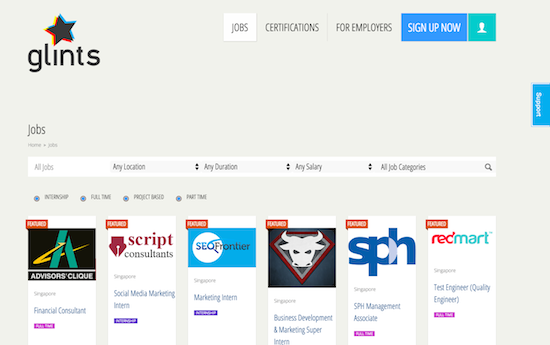Glints team raises US$380K seed round, gives up Ivy League path
By Gabey Goh February 11, 2015
- Funding to boost engineering team and marketing efforts
- First seed-stage company by Singapore Infocomm Investments Pte Ltd

SINGAPORE startup Glints, a professional platform for young people focused on career discovery and development, announced today that it has closed S$475,000 (approximately US$380,000) in an oversubscribed seed round.
Venture firm East Ventures led the round with participation from 500 Startups, SPH Media Fund, Singapore Infocomm Investments (IIPL), 8 Capita, Pix Vine Capital and other private investors including John Tan and Darius Cheung.
Glints aims to bridge the gap between education and employment by being a professional platform for young people focused on career discovery and development.
The startup is an alumnus of accelerator JFDI, having gone through the programme in 2014, with its founders Oswald Yeo, Seah Ying Cong and Looi Qin En the youngest ever accepted. It had previously received S$75,000 (US$59,940) in pre-seed money from private business angels and JFDI.
Commenting on the investment, managing partner at East Ventures Willson Cuaca noted that there is “clearly a gap in the recruitment industry.”
“The incumbent platforms generate a low quality of leads and provides an inefficient filtering process. The young and passionate team has shown market validation in such a short time since inception.
“Many investors have seen the potential in Glints, and many of them continued to show their interest even after the financing round was closed.”
500 Startups managing partner Khailee Ng said: “I am impressed by the team’s passion and commitment, as seen in their decision to take time off their studies to focus on the startup full- time.”
When previously interviewed by DNA last year, the Glints team had just been accepted into Stanford, University of California Berkeley, and Wharton Business School but used their pre-admission gap year to work on their startup full time.
With this new round of funding raised, the decision was made by the founding team to opt out of pursuing further education in order to take Glints as far as it can go.
Yeo admitted that there has “definitely been a lot of societal and familial pressure” not to take such bold moves, especially in the conservative Asian culture.
“We only did this because we have the opportunity to take on such a huge, global problem that we are passionate about solving.
“Most importantly, we are glad to have the opportunity to cross the gap between formal education and the real world sooner,” he added.
Glints is also the first seed-stage company that IIPL has backed.
IIPL head Alex Lin said the decision was made to invest because the team is solving a pressing and global talent problem for society.
“The injection of new funds will speed up their development and help them address the market globally,” he added.
The funding announcement also coincides with the platform’s re-launch yesterday, touting a better user interface, in-app messaging and interview scheduling, advanced filters to search for candidates, and additional features such as pay-per-profile which the team is currently working on.
Behind the Glints and glamour

As a unique feature, users will have access to a Dynamic Skills Tree feature, intended to help youths explore different career paths and guide them to acquire the relevant, in-demand skills.
The Dynamic Skills Tree will canvass a taxonomy of real-world skills demanded for different careers, and match the youth to different skills-acquisition paths through internships, projects and courses.
Asked about what has been the biggest lesson learnt in developing its offering to date, Yeo pointed to the real skills gap between education and employment.
“We realised that the LinkedIn profiles of many young people are pretty empty. Most adults use LinkedIn to show off their career experiences. What about the millions of college graduates graduating each year, with not much career experiences to show?
“How will employers know who has the right skills for the job? This showed us that there was a huge skills gap between what is taught in school, and what is needed in the real world.
“Our time spent in universities in the United States also showed us that this problem is not only a local one that is limited to Singapore, but a global issue that’s pertinent internationally, presenting a huge opportunity,” he added.
Yeo shared that this insight prompted the Dynamic Skills Tree idea, an expansion of the team’s personality-matching system, dubbed the "Glints DNA profiling test".
The team, currently five-strong, is still developing this feature and is still in the early stages of development.
“But this is a use case as we visualise it: Mike, 20, is a college student at NUS School of computing. He knows he likes technology, but is uncertain about his career options, and which skills he needs to acquire in order to qualify for good jobs.
“He is frequently wondering ‘What am I going to do with my life?’ and ‘What skills/experiences do I need?’
"Mike logs into Glints and indicates his interest in technology and data.
“Amongst the sets of related careers recommended by the platform, he finds the career of data analyst particularly appealing. Through the skills tree, he easily identifies the skills needed for this career. The skills tree recommends him projects, internships and courses that he can take to acquire each of these skills.
“He then builds up the relevant sets of skills, all of which are accredited on his Glints profile. Subsequently, his profile is discovered by employers, and he is offered his dream job as a data analyst due to his possessing all the skills needed for the job,” explained Yeo.
By giving young people a tool to independently develop the relevant skills at their own pace, Glints aims to minimise the skills mismatch and help young people land their dream jobs. It currently claims over 7,000 students registered since launching its Beta platform in June 2014.
The pitch to employers is the opportunity to leverage upon an “innovative recruiting tool” to hire the right talent easily and quickly on Glints.
According to the startup, employers struggle to attract the right candidates through job portals, and waste time filtering through irrelevant applications. While headhunters are relatively effective in providing relevant candidates, they are costly.
The team also comprises specialist writers who transform conventional job descriptions into compelling offers to attract applications from top talent.
In addition, the database undergoes strict quality control of its listed profiles through both algorithmic and human screening.
“Rather than paying for listings as per traditional job portals, employers can choose to pay only after relevant candidates have been matched to them,” Yeo added.
Glints claims over 600 companies are already hiring on the platform, including startups such as Easytaxi and Redmart, to international corporations such as Adidas and Puma.
Yeo declined to provide any additional insight into the rate of successful and completed matches the platform has facilitated to date, but shares that the platform has been experiencing good growth in numbers of both participating companies and users.
“We also have had great qualitative feedback from users so far, with multiple testimonials that can be provided upon request,” he added.
Related Stories:
Glints not just a gleam in the eye of three 21yr-old founders
JFDI.Asia and Glints fellowship gives youth hands-on entrepreneurial education
For more technology news and the latest updates, follow us on Twitter, LinkedIn or Like us on Facebook.


